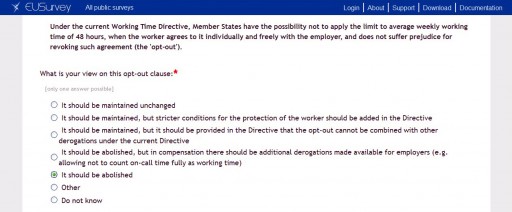FairSharedWork (Attac Germany) invites you, your organisation or network to comment on the public consultations on the review of the EU Working Time Directive if you are in favour of reduction rather than increase of the weekly working hours of the full-time working population. The survey [2] encompasses 35 questions to be rated (explanations optional) and will be online till March 15th 2015.
In which way are our weekly working hours and its regulations related to the environmental cause?
Working time is bound by legal requirements, collective agreements and the operational practice. The EU Working Time Directive (Directive 2003/88/EG) currently in force, for example, aims at „providing minimum standards common to all Member States for protecting workers from health and safety risks associated with excessive or inappropriate working hours, and with inadequate time for rest and recovery from work.“ [3] In principle it sets a maximum of 48 working hours per week since it is still based on the norm of an 8-hour-working-day and on the even older norm of the 6-day-working-week. However, by including an opt-out-clause it enables each individual to sign a contract that exceeds this proposed maximum of working hours.

Only the abolishment of the opt-out-clause can protect workers from health and safety risks associated with excessive working hours
Regulations concerning emergency services (‘on-call time’), ‘standby-time’ and the timing of compensatory rest will rather increase exploitation of the employed few and the neglect of the unemployed many both leading to psychological strain for both groups.
So at first sight, the reduction of working time might rather be understood as a field of action for the unions as compared to environmental NGOs. But beyond the economical and workers’ rights stance, the fair sharing of work is also an ecological project. The reduction of working is crucial for the environment because the limits to industrial growth in the so called developed countries, the finitude of natural resources and the strains on the climate demand a reduction of industrial production. Environmentally harmful production branches like coal mines could be shut down in a manner reconcilable with a welfare state by a reduction of working hours without personnel compensation. More environmental friendly developments like shareeconomy, re- and upcycling activities already exist in our „Ending is better than mending“-age – but to be able to implement them individuals need more time and skills than they would for a simple replacement through a newly bought and produced product. Last but not least all forms of voluntary (environmental) activism are limited by long working days.
However, the reduction of working hours is also about FairSharedWork between women and men, the old and the young and between different regions in (to start with) Europe. That is why we consider it a project relevant to society as a whole. Attac demands the 30-hours working week for Europe and offers a collection of many good reasons for it. Have a look and spread the word! [4]
There are quite different opinions on how the reduction of working hours can practically be implemented. As for our working group, we demand for the reduction of working hours with full compensation of personnel and of wages for low and middle incomes. The simplest example would be as follows: for every three persons reducing their working hours from 40 to 30 a week, one new person will be employed. Therefore the fair share of work and redistribution of profits is an integral part of the concept.
Without the clarification that the 48 hour limit applies per worker the EU Working Time Directive is useless
Some other supporters of and (potential) players in the reduction of working time-movement
France already introduced the 34/35-hour-week in 1998. Even though the generation of new jobs is the main criteria to judge economic measures and the French National Assembly indeed published a study which substantiates the legislaitve initiative the generation of 350.000 new jobs and an increase in productivity and working satisfaction, the European media doesn’t bother to report on this topic. Collectif Roosevelt/ Actes67, is a French non-governmental player, which proposes a redistribution of working hours with the 32-hour-week.
The rising party Podemos which is rooted in the 15-M movement emerging in 2011 in Spain communicates the 35-hour-week as one of their demands.
In Germany the left-wing party DIE LINKE the reduction of working hours is formulated as a goal but the process of reaching it is not further specified. Moreover the union IG Metall launched a survey on the needs of its members which revealed the reduction of working hours as one mayor field of concern. However, due to mayor political defeats on the subject in the early 1990s, IG Metall is hesitant to resume the topic. Even Manuela Schwesig, the Minister of Family Affairs, Senior Citizens, Women and Youth (BMFSFJ), caused a debate on “short full time” for families with small children.
To our knowledge the following national trade unions are in favour of the working time reduction: Italian Confederazione Generale Italiana del Lavoro (CGIL), the Belgian Algemeen Belgisch Vakverbond/ Fédération Générale du Travail de Belgique (ABVV/FGTB), the Austrian Gewerkschaft der Privatangestellten, Druck, Journalismus, Papier (GPA-djp).
Spot lights on the 100 year long history of the reduction of working hours
– USA: Only in 1914 Henry Ford followed the initiative of other small companies to introduce the 8-hour-working-day in his factory. By doing so he mainly aimed at increasing the purchasing power of his employees and at turning them into customers. However the ordinary working week consisted at least six days work per week.
– International: In 1935 the International Labour Organization (ILO) Convention number 47 became known as the Forty-Hour Week Convention:
“Considering that unemployment has become so widespread and continuous, that there are at the present time many millions of workers throughout the world suffering hardship and privation … from which they are justly entitled to be relieved … it is necessary that a continuous effort should be made to reduce hours of work in all forms of employment …“
– Agreement on reducing working hours to 40 hours per week –
Sadly this agreement was not ratified at the time. Shortly afterwards, war preparations resolved the problem of unemployment temporarily.
– In the framework of the reunion of the two Germanies in the early 1990s unions and the civil society fought for a 35-hour-week as a measure to prevent massive unemployment.
– From 1993 to 2003 the Directive 93/104/EG set the maximum working time per week (7 days) on 48 hours. It was superseded by the Directive 2003/88/EG in 2003 without mayor changes in that regard.
In summary this means that for more than 100 years the reduction of working time has been considered apt when productivity and unemployment rose and seen as a way to adapt to new conditions. Even though productivity and employment keep rising and result in higher profits for companies the trend in working time is for longer instead of shorter working hours.
By the way: how many hours are you working per week? How many hours would you prefer to work weekly if it was up to you to decide and if your job could sustain you?
“Recognize the reduction of working time as a measure to reduce massive unemployment in the EU! The reduction of working time is necessary to stimulate an active civil society and to further gender equality! Good work and a good holiday for everybody!”
In the rest of the survey possibilities to explain one’s rating are limited. Feel free though to do so in max. 2000 characters at the end of the survey!
Working Group ArbeitFairTeilen (FairSharedWork), Attac Germany [6]
We are a working group on the federal level aiming at the establishment of a European alliance lobbying for the reduction of working hours. That is why we would like to know about developments connected with the reduction of working hours in your country: Are you part of or do you know any initiatives, unions, parties, … aiming at the reduction of working hours?
If so, please contact us at anne[at]yeenet.eu, Subject: Aw: Article IYNF Newsletter.
We’ll also be partaking in the Blockupy meeting on March 18th in Frankfurt (Main). We hope to see some of you there!
References:
EU-Konsultationsverfahren online
[1] The Working Time Directive (Directive 2003/88/EC)
http://ec.europa.eu/social/main.jsp?catId=706&langId=en&intPageId=205
http://eur-lex.europa.eu/legal-content/EN/ALL/;ELX_SESSIONID=tQgXJ0XD92GnZH1rft2nxpVKGV0HcvpLvk9S2HG0KznnzQqk5QbG!139916245?uri=CELEX:32003L0088
[2] EU Survey: Review of the Working Time Directive (Directive 2003/88/EC)
https://ec.europa.eu/eusurvey/runner/54d2a95e-114a-7edc-217f-5bed8fd02492
[3] European Commission: Public consultation on the review of the working time directive. Background
http://ec.europa.eu/social/main.jsp?catId=333&langId=en&consultId=14&visib=0&furtherConsult=yes
[4] Attac Flyer: 30 Hours a Week for Europe – Overcoming the Crisis with shorter Working Hours (English, French, German, Spanish)
[5] Report of the Commission of the French National Assembly on the results of the 35-hours-week in France
http://www.assemblee-nationale.fr/14/dossiers/impact_reduction_progressive_temps_travail.asp
[6] Homepage of the Working Group ArbeitFairTeilen (FairSharedWork), Attac Germany and the Arbeitszeitverkürzung Jetzt!-Initiative
www.attac-netzwerk.de/ag-arbeitfairteilen/ (German)
http://arbeitszeitverkuerzung-jetzt.de/ (German)


